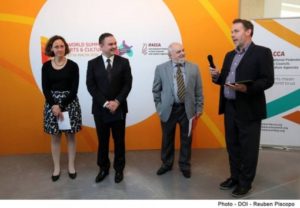The 7th IFACCA World Summit will bring together government and cultural leaders from over 80 countries in Valletta, Malta (18-21 October 2016) to explore Cultural Leadership in the 21st Century. I look forward to this unique opportunity!
The focus of the Summit will be on leadership – a theme that becomes very important with the changing realities in the world today. The arts and culture are in a way at a crossroads as they face challenges and opportunities, such as: the impact of the new technologies, new patterns of migration, the globalized and connected world we live in, the freedom of expression and ensuring cultural diversity, and many more.
Today’s cultural leaders can no longer be just managers in organizational structures. They impact the society. They are visionary people who bring positive societal, economic and cultural changes that benefit local communities and also answer to burning global challenges. They build coalitions of partners and supporters who position arts and culture at the focus of our cities, regions and policy-making approach towards integrated strategies with other sectors. Aimed at reflecting on the changing perception and role of leadership at different levels, the program of the Summit is organized around three thematic clusters:
- Global developments affecting reforms of governance of culture in the 21st century
- National arts and cultural policies in need of vision, innovation and leadership
- Bottom-up approaches and trends: the role of leadership at local levels
Our session during the World Summit is on “Unexpected partnerships: where are the new spaces for creation and creativity and how do we support them?” Join us on October 20th, 2.00-3.30pm. The session will look at examples of innovative and unexpected partnerships within the cultural sector, and partnerships between the cultural sector and others. We will also explore new sectors that provide space for creation and creativity, as well as discuss innovative practices and models of fundraising for sustaining artistic initiatives and projects. I am so pleased to share the session with extraordinary cultural professionals:
- Verónica Ahumada, Director of International Cultural Cooperation, Secretary of Culture (Mexico)
- Honor Harger, Director, Arts Science Museum, Singapore (New Zealand), and
- Dennis Marita, Director of Culture, Ministry of Culture and Tourism (Solomon Islands)
The session will be in a “long table” format and will be moderated by Magdalena Moreno Mujica
Deputy Director IFACCA (Chile/Australia).
 The very rich, promising and diverse program for the Summit is due to the collective efforts of IFACCA team, Arts Council Malta and the Program Director Nina Obuljen Koržinek. Nina has a very rich biography and plenty of professional achievements in the field of cultural policy and research across Europe.
The very rich, promising and diverse program for the Summit is due to the collective efforts of IFACCA team, Arts Council Malta and the Program Director Nina Obuljen Koržinek. Nina has a very rich biography and plenty of professional achievements in the field of cultural policy and research across Europe.
See the full program here: http://2016.artsummit.org/programme/full-programme/ .
Read also the Discussion Paper for the 7th World Summit on Arts and Culture – it addresses the theme of Cultural Leadership with a six regional perspectives and an analysis of three surveys that IFACCA conducted with arts funding agencies, with training providers, and with the wider arts sector.
The International Federation of Arts Councils and Culture Agencies (IFACCA) is the global network of arts councils and ministries of culture, with member organizations in over 70 countries. The vision of the Federation is “a world in which arts and culture thrive and are recognized by governments and peoples for their contribution to society”. To date, six IFACCA World Summits have been held:
- Ottawa, Canada 2000
- Singapore, 2003
- Newcastle Gateshead, England 2006
- Johannesburg, South Africa 2009
- Melbourne, Australia 2011
- Santiago, Chile 2014
 The 2016 Summit will be held in Malta – a country situated in the heart of the Mediterranean, always found at the crossroads, where cultures have been meeting and interacting throughout history. An amazing place to host this unique international event and to stimulate our discussions!
The 2016 Summit will be held in Malta – a country situated in the heart of the Mediterranean, always found at the crossroads, where cultures have been meeting and interacting throughout history. An amazing place to host this unique international event and to stimulate our discussions!


Leave a Reply